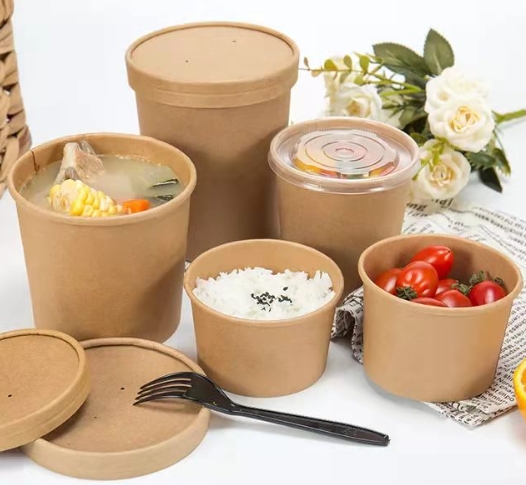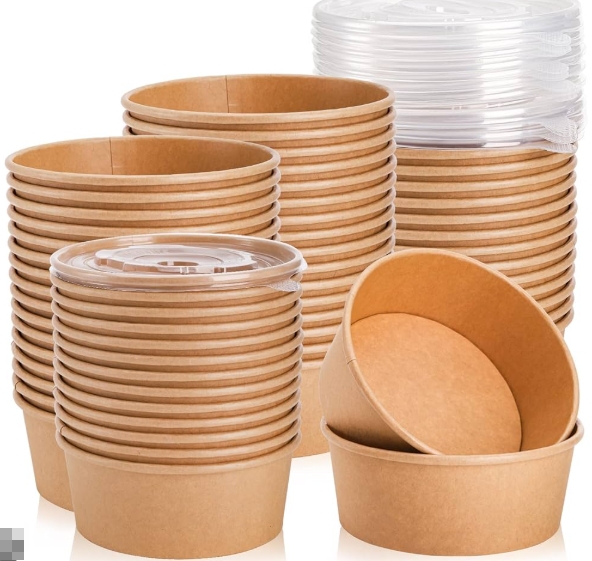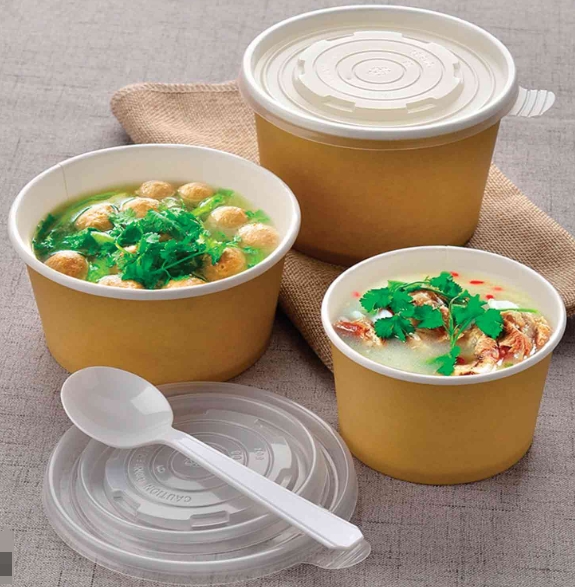
Content Menu
● Understanding the Importance of Packaging
● Key Factors to Consider
>> Food Type and Temperature
>> Leak-Proof and Secure Seal
>> Portion Control and Sizing
>> Stackability and Storage
>> Branding and Customer Experience
● Exploring Material Options
>> Plastic Bowls and Lids
>> Paper and Cardboard Bowls
>> Biodegradable and Compostable Options
>> Reusable Packaging
● Choosing the Right Lid
>> Flat Lids
>> Dome Lids
>> Vented Lids
● Sustainability and Environmental Impact
● Cost Considerations
● Practical Tips for Selection
● Conclusion
● FAQ
>> 1. What is the best material for takeout bowls and lids?
>> 2. How can I prevent leaks during delivery?
>> 3. Are compostable bowls and lids suitable for all types of food?
>> 4. Can I use the same lid for different bowl sizes?
>> 5. How can packaging enhance my brand image?
In today's fast-paced world, takeout and delivery services have become a cornerstone of the food industry. Whether you run a bustling restaurant, a cozy café, or a cloud kitchen, the packaging you choose for your food is as important as the food itself. The right bowl and lid combination ensures that your culinary creations arrive fresh, intact, and visually appealing, directly impacting customer satisfaction and brand loyalty. This comprehensive guide will help you navigate the key considerations, material options, and practical strategies for selecting the best bowls and lids for your takeout and delivery operations.

Understanding the Importance of Packaging
Packaging is much more than a container for food; it is a critical part of the customer experience. The right bowl and lid combination can keep food hot or cold, preserve freshness, and prevent leaks or spills. It also serves as a canvas for your brand and a reflection of your commitment to quality and sustainability. Effective packaging can reduce food waste, minimize delivery mishaps, and even encourage repeat business.
Key Factors to Consider
Food Type and Temperature
Different menu items require different packaging solutions. Hot soups, cold salads, saucy entrees, and dry snacks each have unique needs:
- Hot Foods: Need bowls that can withstand high temperatures without warping or releasing harmful substances. Lids should fit tightly to retain heat and prevent spills.
- Cold Foods: Require insulation to keep contents fresh and cool. Packaging should resist condensation to avoid sogginess.
- Liquid or Saucy Dishes: Demand leak-proof seals to prevent messy deliveries and maintain presentation.
Leak-Proof and Secure Seal
A secure seal is essential for preventing leaks during transit. Bowls and lids should lock together firmly, especially for foods with high liquid content. Test the seal with your actual menu items to ensure it remains intact even when handled roughly.
Portion Control and Sizing
Offering the right portion sizes not only meets customer expectations but also helps manage food costs. Choose bowls in a variety of sizes to suit different dishes. Ensure that lids are compatible with all bowl sizes to streamline operations and reduce inventory complexity.
Stackability and Storage
Efficient storage and transportation are crucial for busy kitchens and delivery drivers. Select bowls and lids that stack neatly without tipping over. Stackable designs save space, reduce the risk of damage, and make order assembly more efficient.
Branding and Customer Experience
Packaging is a powerful branding tool. Custom-printed bowls and lids can enhance brand recognition and create a memorable unboxing experience. Consider adding your logo, brand colors, or unique designs to reinforce your identity and encourage repeat orders.
Exploring Material Options
Plastic Bowls and Lids
Plastic is a popular choice for its versatility, durability, and clarity. Common types include:
- Polypropylene (PP): Heat-resistant and suitable for microwaving.
- Polyethylene Terephthalate (PET): Clear, lightweight, and ideal for cold foods.
- Polystyrene (PS): Rigid but less heat-resistant.
When choosing plastic, consider its recyclability and environmental impact. Some plastics are more easily recycled than others, which can influence your sustainability goals.
Paper and Cardboard Bowls
Paper and cardboard bowls offer a more eco-friendly alternative to plastic. They are often lined with a thin layer of plastic or wax to prevent leaks. These bowls are suitable for both hot and cold foods and can be custom-printed for branding.
Advantages include:
- Renewable material source
- Biodegradability (depending on lining)
- Good insulation properties
However, they may not be as durable as plastic for very wet or greasy foods.
Biodegradable and Compostable Options
With increasing environmental awareness, biodegradable and compostable bowls and lids are gaining popularity. Made from materials like cornstarch, sugarcane bagasse, or bamboo, these options break down more quickly in composting facilities.
Benefits include:
- Reduced environmental footprint
- Positive brand image among eco-conscious consumers
It is important to verify that these materials meet local composting standards and that your customers have access to appropriate disposal facilities.
Reusable Packaging
Some businesses are exploring reusable bowl and lid systems to minimize waste. These containers are made from durable materials and can be returned, washed, and reused multiple times.
Considerations for reusable packaging:
- Initial investment and logistics for returns
- Cleaning and sanitization protocols
- Incentives for customer participation

Choosing the Right Lid
The lid is as important as the bowl itself. The right lid ensures food safety, maintains temperature, and prevents spills.
Flat Lids
Flat lids are ideal for stackability and space-saving during transport. They are best suited for dry or solid foods that do not require extra headroom.
Dome Lids
Dome lids provide additional space for foods with toppings or items that need to maintain their shape, such as salads with added proteins or desserts with whipped cream.
Vented Lids
Vented lids are crucial for hot foods that release steam. The vents prevent condensation, which can make fried foods soggy or cause pressure build-up. They also help maintain food texture and safety.
Sustainability and Environmental Impact
As consumers become more environmentally conscious, businesses must consider the sustainability of their packaging choices. Here are key strategies:
- Opt for recyclable, biodegradable, or compostable materials.
- Minimize packaging size and weight to reduce waste.
- Educate customers on proper disposal methods.
- Partner with suppliers who prioritize sustainable practices.
Implementing green initiatives can improve your brand image and attract a loyal, eco-minded customer base.
Cost Considerations
Balancing quality and cost is a challenge for any food service provider. While premium materials may offer better performance and sustainability, they often come at a higher price. Consider the following strategies to manage costs:
- Purchase in bulk to secure discounts.
- Standardize bowl and lid sizes to reduce inventory complexity.
- Evaluate the total cost of ownership, including potential savings from reduced food waste and improved customer satisfaction.
Remember, investing in quality packaging can lead to fewer complaints, better reviews, and increased repeat business.
Practical Tips for Selection
- Test before committing: Order samples and test with your menu items under real delivery conditions.
- Seek customer feedback: Ask for input on packaging performance and make adjustments as needed.
- Stay informed: Keep up with industry trends and evolving regulations regarding food packaging.
- Prioritize versatility: Choose bowls and lids that work for multiple menu items to simplify operations.
- Work with trusted suppliers: Build relationships with reputable packaging providers who can offer guidance and support.
Conclusion
Selecting the best bowl and lid for takeout and delivery services is a multifaceted decision that impacts food quality, customer experience, and your business's reputation. By considering food type, seal integrity, material, sustainability, and cost, you can make informed choices that benefit both your customers and your bottom line. As the industry continues to evolve, staying proactive and adaptable in your packaging strategy will ensure ongoing success.

FAQ
1. What is the best material for takeout bowls and lids?
The best material depends on your menu and sustainability goals. Plastic is durable and versatile, paper is eco-friendly, and compostable options appeal to environmentally conscious customers. Evaluate each based on food compatibility and disposal options.
2. How can I prevent leaks during delivery?
Choose bowls and lids that form a tight, secure seal. Test containers with your menu items, especially liquids and sauces, to ensure they remain leak-proof during transport.
3. Are compostable bowls and lids suitable for all types of food?
Compostable packaging works well for most foods but may not be ideal for very hot, greasy, or liquid-heavy dishes unless specifically designed for those conditions. Always check the manufacturer's recommendations.
4. Can I use the same lid for different bowl sizes?
Some lids are designed to fit multiple bowl sizes, which can simplify inventory and reduce costs. Confirm compatibility with your supplier before purchasing in bulk.
5. How can packaging enhance my brand image?
Custom printing your logo, using unique colors, and choosing sustainable materials can all enhance your brand's image. Memorable packaging creates a positive impression and encourages repeat business.

















